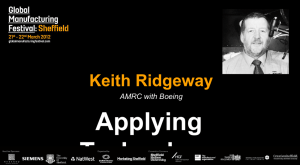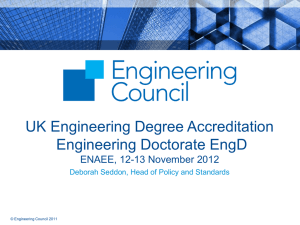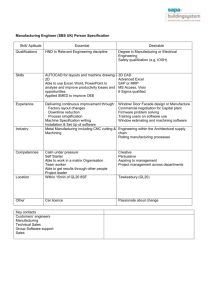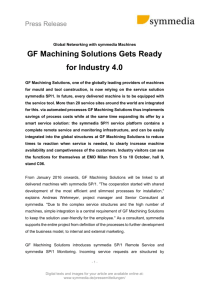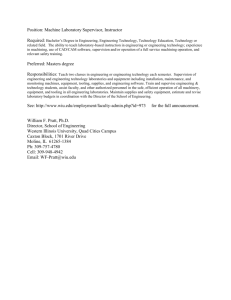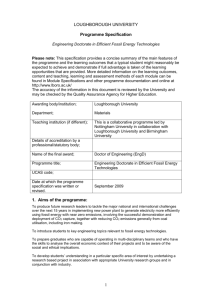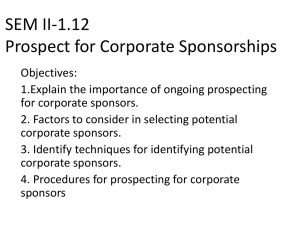EngD Industry Sponsorship Proposal Form
advertisement
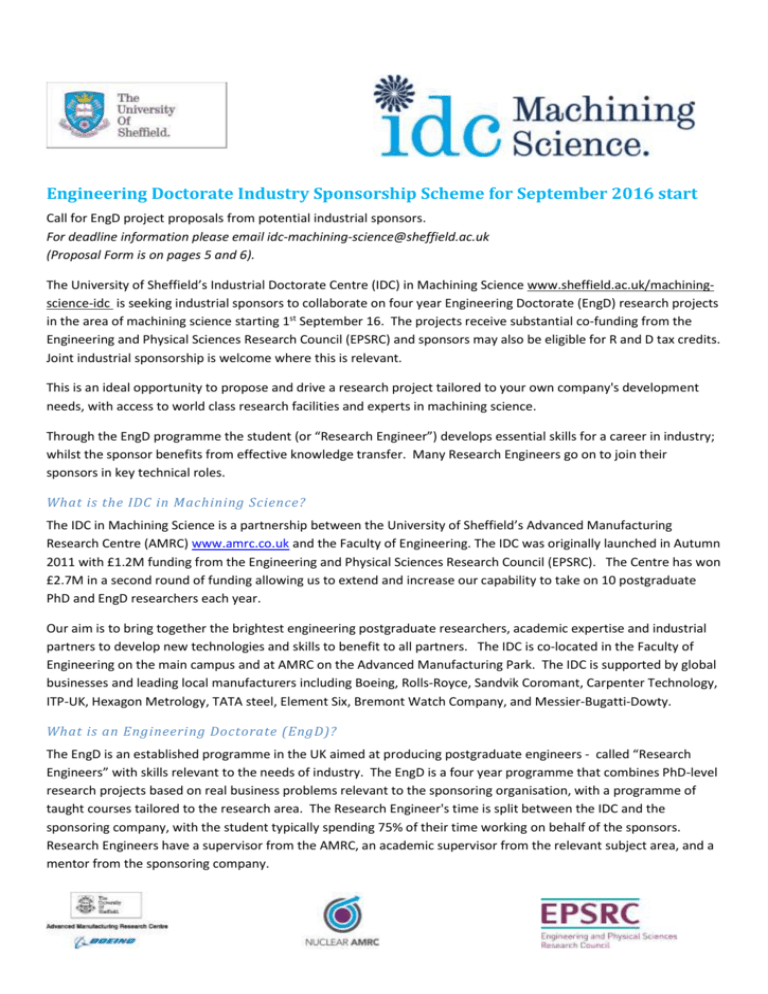
Engineering Doctorate Industry Sponsorship Scheme for September 2016 start Call for EngD project proposals from potential industrial sponsors. For deadline information please email idc-machining-science@sheffield.ac.uk (Proposal Form is on pages 5 and 6). The University of Sheffield’s Industrial Doctorate Centre (IDC) in Machining Science www.sheffield.ac.uk/machiningscience-idc is seeking industrial sponsors to collaborate on four year Engineering Doctorate (EngD) research projects in the area of machining science starting 1st September 16. The projects receive substantial co-funding from the Engineering and Physical Sciences Research Council (EPSRC) and sponsors may also be eligible for R and D tax credits. Joint industrial sponsorship is welcome where this is relevant. This is an ideal opportunity to propose and drive a research project tailored to your own company's development needs, with access to world class research facilities and experts in machining science. Through the EngD programme the student (or “Research Engineer”) develops essential skills for a career in industry; whilst the sponsor benefits from effective knowledge transfer. Many Research Engineers go on to join their sponsors in key technical roles. What is the IDC in Machining Science? The IDC in Machining Science is a partnership between the University of Sheffield’s Advanced Manufacturing Research Centre (AMRC) www.amrc.co.uk and the Faculty of Engineering. The IDC was originally launched in Autumn 2011 with £1.2M funding from the Engineering and Physical Sciences Research Council (EPSRC). The Centre has won £2.7M in a second round of funding allowing us to extend and increase our capability to take on 10 postgraduate PhD and EngD researchers each year. Our aim is to bring together the brightest engineering postgraduate researchers, academic expertise and industrial partners to develop new technologies and skills to benefit to all partners. The IDC is co-located in the Faculty of Engineering on the main campus and at AMRC on the Advanced Manufacturing Park. The IDC is supported by global businesses and leading local manufacturers including Boeing, Rolls-Royce, Sandvik Coromant, Carpenter Technology, ITP-UK, Hexagon Metrology, TATA steel, Element Six, Bremont Watch Company, and Messier-Bugatti-Dowty. What is an Engineering Doctorate (EngD)? The EngD is an established programme in the UK aimed at producing postgraduate engineers - called “Research Engineers” with skills relevant to the needs of industry. The EngD is a four year programme that combines PhD-level research projects based on real business problems relevant to the sponsoring organisation, with a programme of taught courses tailored to the research area. The Research Engineer's time is split between the IDC and the sponsoring company, with the student typically spending 75% of their time working on behalf of the sponsors. Research Engineers have a supervisor from the AMRC, an academic supervisor from the relevant subject area, and a mentor from the sponsoring company. Why sponsor an Engineering Doctorate? A cost effective way for companies to get involved in relevant leading edge research which most companies would not have the funding, expertise or equipment to undertake alone. The EngD research project is based on a proposal from the sponsoring company, so the research is of real technical and commercial significance to the sponsors. The unique nature of the EngD means that Research Engineers are academically strong and highly committed to solving real world research problems - a valuable asset to the sponsor. Many EngDs are recruited by their sponsor after their degree. Through the EngD your organisation will have access to world-leading expertise in machining science and startof-the-art equipment in the AMRC; your organisation will be part of an extended network of likeminded organisations. Current EngD projects in the IDC in Machining Scienc e The following is a selection of active EngD projects that demonstrates the wide range of themes. Development of deep hole drilling technology for extreme L/D ratio holes. R&D into tool tip tracking and steering technology. Rolls-Royce Effect of Resin on Tool Wear in CFRP Machining Sandvik Coromant Effects of High Velocity Machining of High Strength Titanium Alloy Messier-Bugatti-Dowty Thermo-Mechanical Impact of Machining Process on Work Piece Material Micro Structure Sandvik Coromant RR1000 Machining Optimisation Rolls-Royce Chatter Reduction with Tuned Mass Holders Boeing Correlation between machining monitoring signals, cutting tools wear and surface integrity on High Strength Titanium Alloys Messier-Bugatti-Dowty Advanced Cost Engineering for Application of High Value Manufacturing Technology Rolls-Royce Fundamentals of Advanced Composite Machining Rolls-Royce Finish Machining of Novel High Strength Aerospace Materials Rolls-Royce Optimisation of Finish Machining of Advanced Aerospace Materials Rolls-Royce Machinability method development for new aerospace powder materials Rolls-Royce and Carpenter Technology Measurement Performance of CNC Machine Tools and Robots Hexagon Metrology Surface integrity oriented development of machining technologies for Ti 6-4 ITP-UK High strength Titanium alloys surface integrity after complex machining operations and post machining special processes Messier-Bugatti-Dowty Automated testing of advanced cutting tool materials Element Six What will it cost? The standard industrial sponsor contribution for a 4 year EngD studentship is £68,000 (£17,000 pa) (see below for a breakdown). Sponsors may also be able to claim R and D tax credits (http://www.hmrc.gov.uk/ct/formsrates/claims/randd.htm). EngD in Machining Science – Standard Sponsorship Package (for Sept 16 start) Industrial Sponsor Contribution is £68,000* (£17,000 per annum) matched by EPSRC Contribution of £68,000. Breakdown... £10k for project experimental costs* £10k for expenses relating to the studentship – eg conferences, travel, laptop, safety equipment etc £88k for student stipend* and academic fees £26k contribution to group training and activities and administration. * The standard sponsorship package assumes that project experimental costs will not exceed £10k; if this is not the case sponsors may need to provide additional funds /resources. Sponsors may also choose to top up the standard student stipend (£18,000 per annum) to attract the most talented students. For projects funded through “AMRC Directed Generic Funding” the contribution is £20,000 per annum. Alternatively, sponsors may fully sponsor the project/studentship, or sponsor a current employee through the EngD programme. Contact the Centre Manager for advice about these options and the costs involved. How are projects selected? Potential sponsors are asked to submit an Outline Proposal Form for review by the IDC Board. The Board evaluates proposals against the criteria in the table below, selecting approximately five projects each year for EPSRC cofunding. Key Issues / Drivers Funding Performance Criteria 0.2 capability fit percentage industrial funding number of industrial partners Knowledge 0.29 Industrial impact Novelty Academic strength Buy in 0.2 1st time sponsor of EngDs training opportunities for student within the sponsoring organisation scoring (score out of 10) No capability (automatic rejection) Limited research applicability or core UoS competence - score 5 Good fit for both research content and UoS capability - score 10 ESPRC/ industrial - score 0 fully industry sponsored - score 10 1 industrial sponsor - score 0 2 sponsors - score 5 3+ sponsors - score 10 Sliding scale 1-10 High - Impact for funding company and wider industry Sliding scale 1-10 Sliding scale 1-10 Yes - score 10 Previous sponsor of EngD – score 0 Sliding scale 1-10 High for well specified support Weighting 0.30 0.15 0.10 0.05 0.50 0.15 0.15 0.20 0.20 0.05 0.05 level of supervisory support for student from sponsor Sliding scale 1-10 High for well specified support 0.05 letter of support from sponsors senior management No letter score 0; Letter score 10 0.05 What about IPR? The EngD project is a close partnership between the sponsor and the University, and there will be some joint outputs and publications. We can negotiate IP arrangements, and will follow a reasonable approach to publication (i.e. sponsor prior approval, removal of sensitive information, timing of publications etc). How are students recruited? The IDC advertises all EngD projects widely through the relevant channels, and sponsors are also encouraged to advertise the studentships. Candidates must have or expect to obtain a first or good 2:1 degree or strong Masters in a relevant subject. IDC manages the overall recruitment process, but sponsors are encouraged to participate at all stages and especially at the interview stage. Recruitment cycle and EngD Project start dates EngD projects attract interest from final year students, recent graduates and those already in employment. To maximise the number of strong applications, EngD project advertisements should fit in with the job searching cycle for final year students. Most final year students start looking for research study / employment in the Autumn to Spring in their final year, with a view to commencing employment / research after graduating in Summer. All our EngDs and PhDs join as a single cohort and attend our month long induction programme starting 1st September. This gives the EngD Research Engineers a chance to visit the sponsors and to bed into the project and AMRC, before the Autumn semester commences at the end of September. Indicative deadlines The IDC Board reviews EngD project proposals at regular intervals throughout the year, until the EPSRC co-funding is exhausted. We recommend that you contact the Centre Manager (idc-machining-science@sheffield.ac.uk) as soon as possible if you are considering submitting a project proposal. Next steps If you have a firm idea for an EngD project, please complete the form below and submit it to the IDC Centre Manager. If you prefer to discuss potential project themes in more detail before submitting a proposal, please contact the Centre Manager in the first instance. Join the IDC in Machining Science mailing list To receive updates on the work of the IDC in Machining Science please send your contact details including email address to the Centre Manager; or follow us on Twitter twitter.com/@IDCMachSci Contact Details Industrial Doctorate Centre in Machining Science AMRC and Faculty of Engineering, University of Sheffield T: +44(0)114 222 9949 / 7865 W: http://www.sheffield.ac.uk/machining-science-idc E: idc-machining-science@sheffield.ac.uk Twitter: https://twitter.com/idcmachsci Industrial Doctorate Centre in Machining Science EngD Project Outline Proposal by Sponsor Completed forms should be returned by email to the Centre Team at idc-machining-science@sheffield.ac.uk. The IDC may contact you for further discussions to help refine the proposal before submission to the Board. Title of Proposed Project or Project Theme Start date Industrial project sponsor 1st September 2016 Organisation Contact Name Role Email Tel If more than one sponsoring company, please give details here. Academic and AMRC supervisors (if known) Project Details (to be completed by industry sponsor with guidance from AMRC if required) Briefly describe the work to be carried out in the proposed EngD studentship project (maximum 800 words). Describe the specific scientific and/or technological challenges to be addressed (maximum 800 words) What are the potential benefits of the collaboration for the company and for the academic partners? Are there wider benefits that may result (maximum 800 words)? Do the project experimentation costs lie within the total £10k for the standard sponsorship package? If not please indicate how additional financial or other resource requirements will be met. Do the sponsors wish to top up the student stipend beyond £18,000pa? 03/11/15
